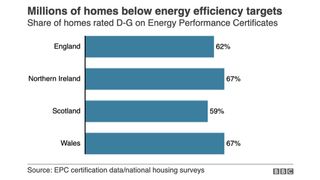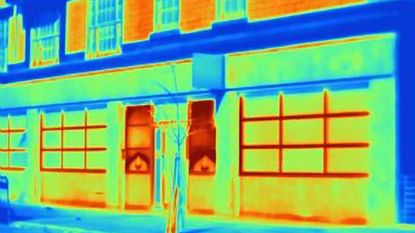Almost two-thirds of the UK's homes are failing to meet long-term efficiency targets when it comes to energy. That's according to data analysed by the BBC, which shows that more than 12 million houses have been given an Energy Performance Certificate (EPC) grade of below C.
The EPC rating was introduced in 2007 to give an indication of how energy efficient a property is. Grades from from A-G.
If your home is rated below a C grade, it means your energy use and bills are higher than they should be – even if you regularly run an energy comparison to find the best energy deal possible for your property.
This isn't just bad news for two-thirds of the UK. It's also bad news for the environment, with tonnes more CO2 gases being released than needed.
New-build standards
While new-build homes are built with an EPC in mind, homes constructed before 1990 may not have the same energy-saving measures included, such as additional glazing and insulation.
According to annual greenhouse gas emissions data, 65.9 million tonnes of CO2 was produced by UK homes in 2018. That's more than power stations used to generate it.
Analysis from the BBC’s Shared Data Unit has highlighted that local authorities with the highest CO2 emissions across England and Wales were all located in rural areas.

It’s led to calls for a nationwide upgrade scheme to begin, although there are already some schemes in place. The Department for Business, Energy and Industrial Strategy has said it is investing £6 billion to upgrade properties by 2035 "where practical, cost-effective and affordable".
It is also exploring how to reduce the costs of retrofitting properties, and says it has invested over £320m into helping heat homes with lower carbon alternatives, such as heat networks and heat pumps. In addition, from April 2020 onward landlords will not be allowed to start a new tenancy or renew one without the property holding an EPC of Grade E or above.
The aim is for houses to reach a Grade C or above, with fuel-poor households and rented homes due to achieve the same standard by 2030.
Additional costs
Experts estimate the cost of retrofitting properties with energy efficiency measures could be anything between £18,000 to £150,000. However, councils and housing associations have an important role to play in influencing change.
"Developers aren't interested in running costs, they build it and walk away," said John Palmer from the Passivhaus Trust, which measures the adoption of a low energy design. "Local authorities and housing associations are. They have a vested interest in keeping running costs as low as possible for themselves or for tenants."
With only around 30% of current homes hitting the Grade C or above target, the government has cited a 2035 deadline for changes to be adopted. However, there is still policy ambiguity over specific terms, and the estimated number of houses that will need to be adopted.
How to reduce your bills
Some of the most effective ways to improve the energy efficiency of your home include loft insulation, double glazing, wall insulation and replacing your boiler with a new, energy-efficient boiler.
You'll also find some handy tips for reducing your energy use over at EDF. Finally, the fastest way to reduce your energy bills is to run an energy comparison and choose the best energy deal for your home.



